Mark Gessner at Lake Stechlin. Photo: David Außerhofer
Thinking out of the box with the big picture in mind is one of the important precepts in today’s research environment. This is due to the ever-increasing specialisation that prevents a clear vision of the whole, and to the growing expectations of society for science to develop cross-disciplinary approaches that address global challenges. Teamwork is vital in this context. It offers unfamiliar perspectives beyond individual disciplines and opportunities to promote basic knowledge and to develop solutions to pressing problems facing society.
Many regret the vanishing of the polymath. Alexander von Humboldt is often cited as a shining example of such scholars, as is Gottfried Wilhelm Leibniz, the namesake of our association. And yet we all too often forget that Leibniz and Humboldt were by no means alone in their interdisciplinary and transdisciplinary endeavours. On the contrary, lively exchange with their peers from diverse scientific disciplines and with numerous other correspondents in politics and society at large was a mainstay of their success. Both scholars thus clearly exemplify the archetype of the international networker. This is testified not only by their extensive body of correspondence.
Humboldt was an excellent networker
Humboldt in particular is remarkable not just on account of the many years of field investigations he is so well known for. He also travelled extensively as a lecturer and valued discussion partner and spent extended research stays at scientific institutions in Europe and America, where he conducted comparative empirical research – in direct collaboration with colleagues – to derive general principles. Clearly, teamwork in networks and research alliances that bring together complementary expertise and ingenuity is by no means a new phenomenon. Now, however, following the footsteps of the polymaths, teamwork has become essential for environmental research to make new discoveries, understand the big picture and apply the knowledge for the benefit of society.
The IGB Annual Report 2017 will often use words like “interdisciplinary” and “transdisciplinary.” And you will find hints to the networks and cooperations, large and small, within which much of IGB’s research is organised – whether at institute or elsewhere in Germany or abroad. Indeed, major international collaborations are not the only way to take a broad view and think out of the box. Scientificexchange and collaboration with colleagues in the lab or office next door can be equally fruitful.
50 scientists of IGB working together on a project about light pollution
After all, scientists with notably different backgrounds work under a single roof at IGB. Leibniz and Humboldt would have envied us. The collaborative project Illuminating Lake Ecosystems is one such example: more than 50 participants from virtually all IGB departments have been contributing, plus various international partners. The project involves large-scale experiments in IGB’s LakeLab supported by teams of scientists with complementary expertise. The unique opportunities that this facility offers are also one of the reasons why IGB plays a key role in the EU-funded infrastructure project AQUACOSM, which is coordinated at IGB and seeks to achieve a conceptual, methodological and practical fusion of experimental ecosystem research in oceans, lakes and flowing waters. The BAGGERSEE project is an example of innovative transdisciplinary research. In collaboration with representatives of a Nature Conservation Foundation in Berlin and the Angling Association of Lower Saxony, which unites 20 fishing clubs, the project investigates how water-related recreation and nature conservation can be reconciled. The AQUATAG project pursues a similar objective, exploiting new means of communication by analysing Twitter data to gain insights into water-related leisure activities.
Inter- and transdisciplinary in projects and doctoral programs
IGB has collaborated with partners in science, policy, businesses and civil society for a long time, including in the past year. The goals are to develop solutions and recommendations for action to mitigate pressing environmental issues and, thus, to support decision-making processes at the local, national and international level. As part of our Science Society Interface (SSI) strategy, IGB continued in 2017 to engage in dialogues with stakeholders and the public. This involved activities such as organising events on light pollution and freshwater biodiversity. In addition, IGB was instrumental in launching the Alliance for Freshwater Life, which aims to give freshwater biodiversity a voice at the global and regional level by promoting both coordinated scientific research into and effective conservation of biodiversity in inland waters.
Attention is given to interdisciplinarity and transdisciplinarity at IGB also when it comes to training early-career scientists. For example, IGB is currently involved in a project named EUROFLOW (EUROpean training and research network for environmental FLOW management in river basins), which intends to convey important aspects of river management to young researchers. The Innovative Training Network MANTEL (Management of Extreme Climatic Events in Lakes and Reservoirs for the Protection of Ecosystem Services; page 14) and the Urban Water Interfaces (UWI) Research Training Group in which IGB has been involved for several years, aim to draw attention to the bigger picture beyond the individual research questions of the doctoral students.
Renowned behavioural ecologist Professor Victoria Braithwaite new head of IGB
The appointment of the new IGB director also reflects the institute’s focus on teamwork and cooperation across disciplinary boundaries. Professor Victoria Braithwaite will start in her new role at IGB and as a professor at the Freie Universität Berlin in summer this year. The British scientist with experience in research and teaching in the UK, Norway and, for the last 10 years, at Penn State University in Pennsylvania, USA, is well familiar with interdisciplinary and cooperative research. Trained as a behavioural ecologist, she has quickly established cross-disciplinary links with neurosciene and other disciplines and has assumed leadership roles as a coordinator of such collaborations. She is also no stranger to Germany, having spent two years in Berlin as a fellow of the renowned Institute for Advanced Study. We are delighted that IGB is now set to benefit from her professional and personal skills and her leadership experience.
I am most grateful to our partners for accompanying and supporting IGB on our interdisciplinary, transdisciplinary and also disciplinary journeys in 2017. These partners include, foremost, the three large universities in Berlin as well as the University of Potsdam, our close allies in teaching and research; our Scientific Advisory Board; the Forschungsverbund Berlin; and the Leibniz Association. My equally sincere thanks go to the representatives of the Senate Chancellery of the Federal State of Berlin and the German Federal Ministry of Education and Research (BMBF) for enabling IGB’s accomplishments last year by providing a solid base funding and non-material support. Some of these achievements are outlined in this Annual Report. Besides the financial contributions, I particularly appreciate the open and constructive dialogue, which helps us to overcome the occasional adversities befalling science management. Last but not least, I would like to thank the entire IGB team – our many staff members who engage in research, administration or technical activities. Without their commitment the institute would merely be an empty shell.
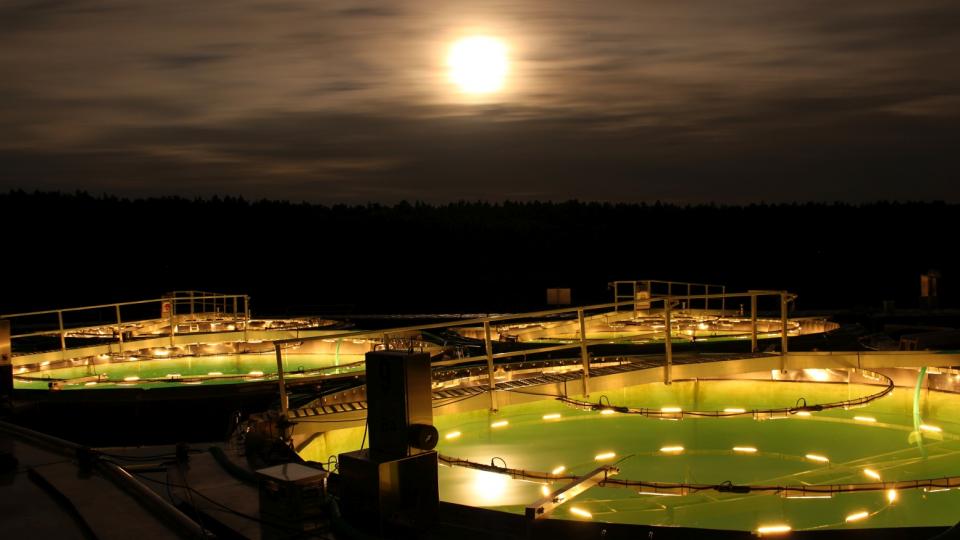
Investigating light pollution at Lake Stechlin. Photo: Andreas Jechow
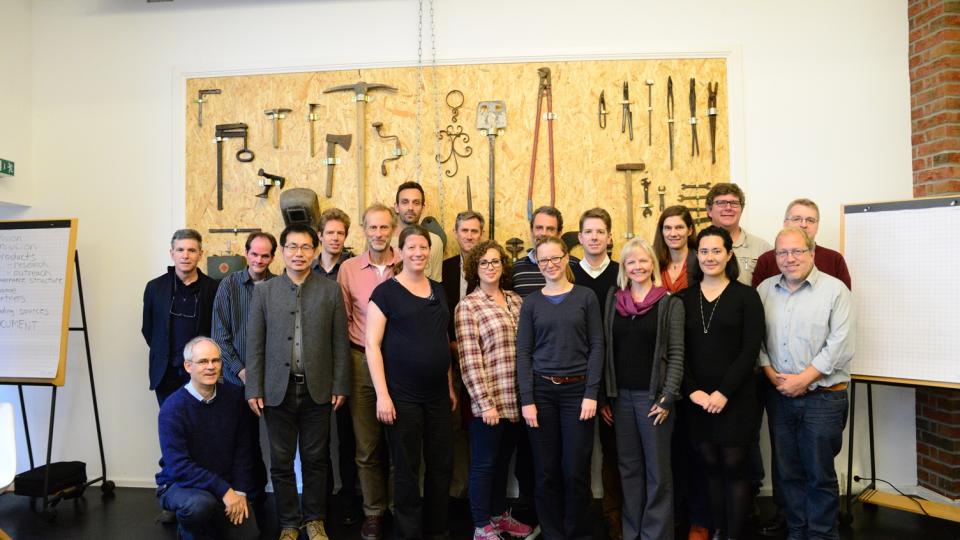
2017: New Alliance for Freshwater Life. Photo: IGB

Aquaponics system Tomatofish in Assiut (Egypt). Photo: IGB
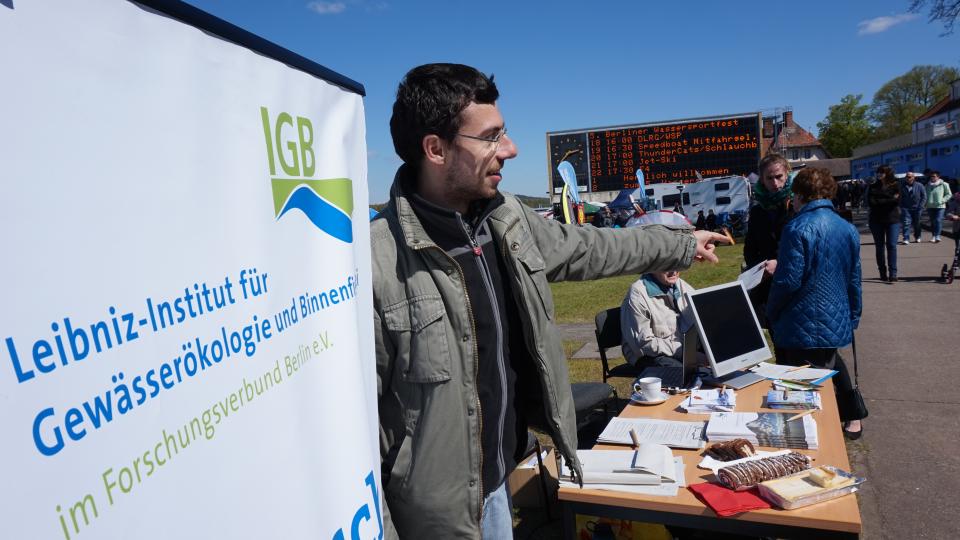
IGB at the Water Sports Festival in Berlin.Photo: IGB
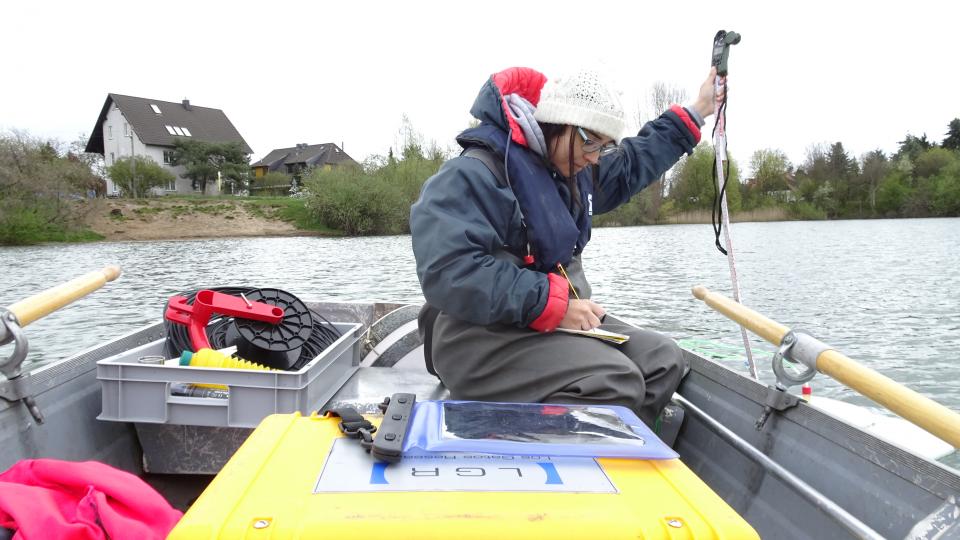
Doctoral student Sonia Herrero is taking water samples to measure methan emissions from freshwaters in Berlin. Photo: Clara Romero
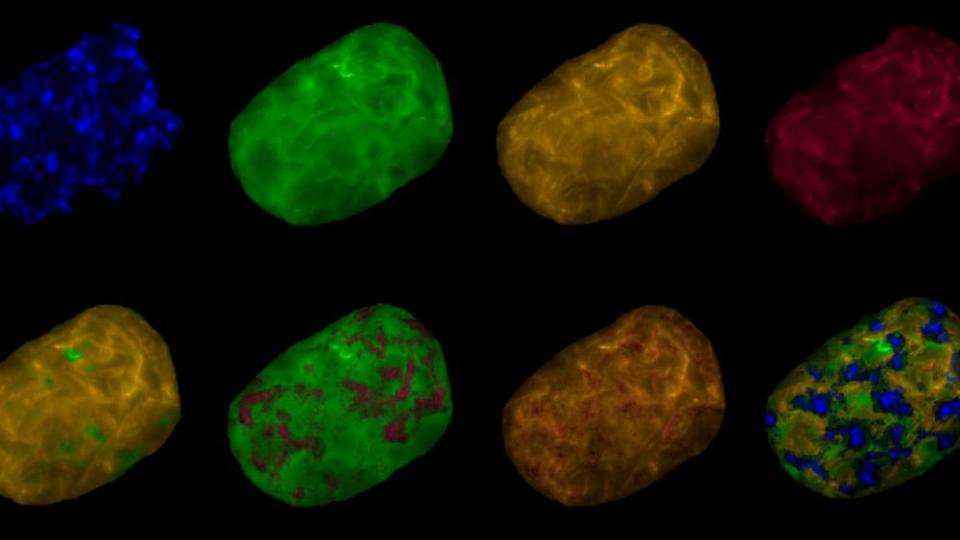
Achromatium oxaliferum is a giant freshwater bacterium and can be found in Lake Stechlin. International scientists (also from IGB) have revealed that the many chromosomes of a bacterium are not identical copies of each other. Photo: IGB



